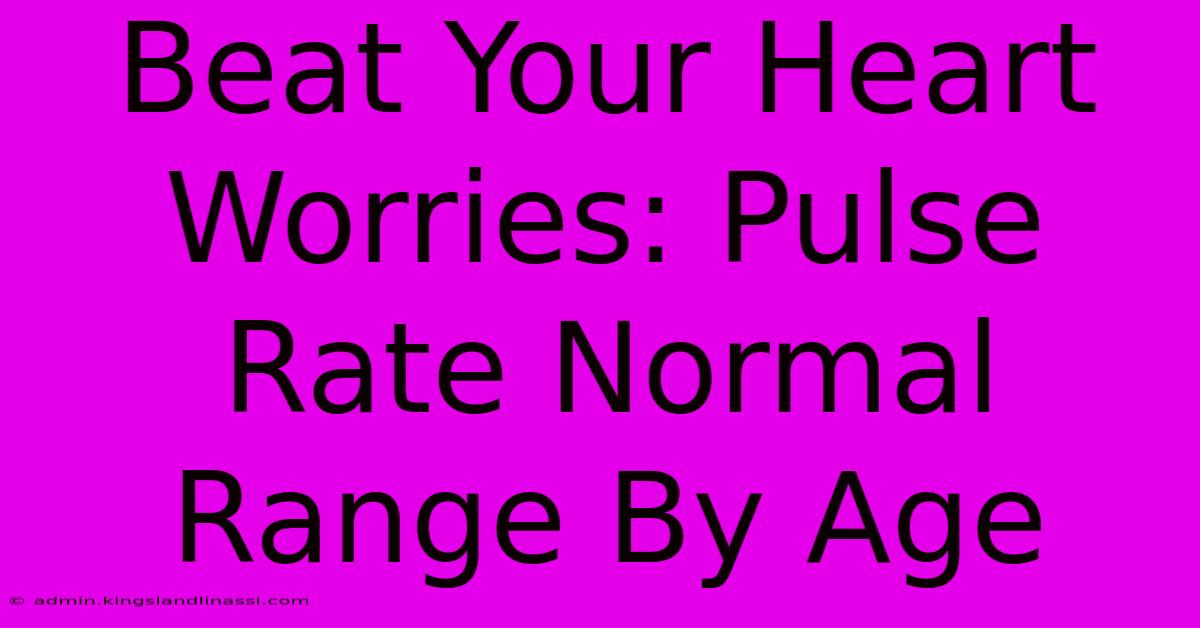Beat Your Heart Worries: Pulse Rate Normal Range By Age

Table of Contents
Beat Your Heart Worries: Pulse Rate Normal Range By Age
Understanding your pulse rate is crucial for maintaining good health. Knowing what's normal for your age can help you identify potential problems early and take steps to improve your cardiovascular well-being. This comprehensive guide will explore the normal pulse rate range by age, factors influencing pulse rate, and when you should seek medical attention.
What is a Normal Pulse Rate?
Your pulse rate, or heart rate, is the number of times your heart beats per minute (BPM). A normal resting heart rate varies depending on several factors, most significantly your age. While there's a general range, individual variations are common. Don't panic if your heart rate falls slightly outside the typical range; consult your doctor if you have persistent concerns.
Normal Pulse Rate Ranges by Age
It's important to remember these are ranges, and individual variation is expected. Always consult with your doctor if you have concerns about your heart rate.
| Age Group | Normal Resting Heart Rate (BPM) |
|---|---|
| Newborn (0-1 month) | 70-190 |
| Infant (1-11 months) | 80-160 |
| Child (1-6 years) | 75-115 |
| Child (6-10 years) | 70-110 |
| Child (10-15 years) | 60-100 |
| Teenager (15-18 years) | 60-100 |
| Adult (18-60 years) | 60-100 |
| Adult (60+ years) | 60-100 |
Important Note: Athletes often have lower resting heart rates due to increased cardiovascular fitness. This is perfectly normal.
Factors Affecting Your Pulse Rate
Several factors can influence your pulse rate, including:
- Age: As mentioned above, age significantly impacts your resting heart rate.
- Physical activity: Exercise will temporarily increase your heart rate. The more intense the activity, the higher the rate.
- Medication: Certain medications can affect heart rate, both increasing and decreasing it.
- Body temperature: Fever or other conditions causing a high body temperature can increase heart rate.
- Stress and anxiety: Emotional stress and anxiety can elevate your pulse rate.
- Dehydration: Lack of fluids can cause your heart to work harder, resulting in a higher heart rate.
- Underlying medical conditions: Various medical conditions, such as heart disease, can affect heart rate.
How to Check Your Pulse Rate
Checking your pulse is simple:
- Locate your pulse: Common locations include your wrist (radial artery) or neck (carotid artery).
- Count the beats: Using a watch or clock with a second hand, count the number of beats for 60 seconds. Alternatively, count for 30 seconds and multiply by two.
- Record your heart rate: Note your resting heart rate in beats per minute (BPM). Repeat this process several times throughout the day to get a clearer picture.
When to See a Doctor
While variations within the normal range are expected, it's crucial to seek medical attention if you experience:
- A persistently high heart rate (tachycardia): This could indicate an underlying medical problem.
- A persistently low heart rate (bradycardia): Similarly, a consistently low heart rate can be a cause for concern.
- Irregular heartbeat (arrhythmia): An irregular or erratic heartbeat requires immediate medical evaluation.
- Chest pain or discomfort: Chest pain accompanied by a rapid or irregular heartbeat is a medical emergency.
- Dizziness or lightheadedness: These symptoms, particularly when associated with changes in heart rate, warrant a doctor's visit.
- Shortness of breath: Difficulty breathing, especially when at rest, should be investigated by a healthcare professional.
Don't hesitate to consult your doctor if you have any concerns about your heart rate or experience any of the symptoms listed above. Early detection and intervention are key to maintaining optimal cardiovascular health. Regular check-ups and open communication with your physician are essential components of a proactive approach to heart health.

Thank you for visiting our website wich cover about Beat Your Heart Worries: Pulse Rate Normal Range By Age. We hope the information provided has been useful to you. Feel free to contact us if you have any questions or need further assistance. See you next time and dont miss to bookmark.
Featured Posts
-
Unlock Your Inner Detective Que Son Las Adivinanzas
Apr 21, 2025
-
Salman Khans Age A Testament To Fitness
Apr 21, 2025
-
Halle Baileys Net Worth A Look At Her Evolving Fortune
Apr 21, 2025
-
Embrace Your Inner Goddess Strong Hair Edition
Apr 21, 2025
-
Thomas Gravesen S Net Worth The Ultimate Guide
Apr 21, 2025
